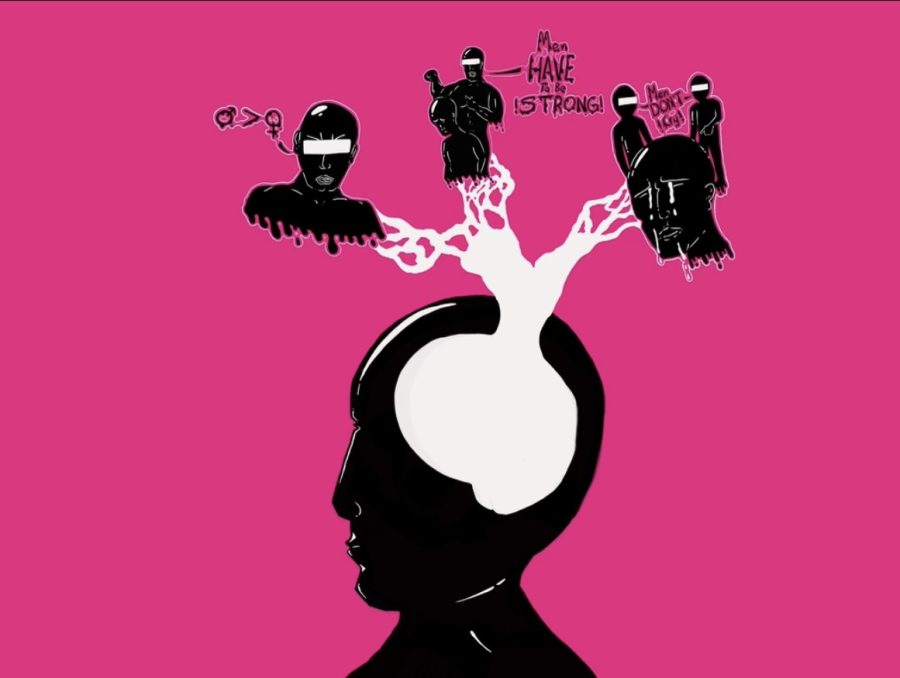The Problem With Toxic Masculinity
Since the early 1900s, toxic masculinity has held a narrow and repressive description of manhood that’s defined by sex, status, and aggression. Men had to uphold the role of being the protectors, breadwinners, providers, and overall care and control their families.
Unfortunately, toxic masculinity is still very predominant in younger generations such as generation Z; not allowing men and boys to show vulnerability and to fully express themselves. This generational mindset to show control and restraint over basic human emotions does not benefit men or anyone, instead it pushes the harmful narrative that people cannot truly be themselves.
“I feel like the older generation tend to be opposed to the idea [of toxic masculinity] and those that impose [it] a lot more than younger generations,” sophomore Felipe Dominguez said. “Older generations definitely enforced toxic masculinity a lot more, whereas Gen Z is more accepting.”
Toxic masculinity is outdated and the opposite compared to the progressive times of gender equality and feminism movements that have paved way for women to rise up and strive for independence and strength without the aid of men.
Toxic masculinity is rarely talked about amongst males, but it’s still very prevalent in workplaces, commonly shown by male counterparts partaking in hostile sexism. Hostile sexism, includes making negative stereotypes, assessments, and evaluations about a gender. This is shown by male affiliates making general statements or remarks about women being inferior to men, not seen as smart enough for a particular subject, and stating that female counterparts are too emotional. It diminishes womens’ work ethic and causes tension within many businesses.
“When I think about male and female relationships, there should be equality from both sides, both of them should be working harder and both should be respected,” sophomore Kyle Kieu said. “For example, if a woman takes time off from work, the male in the relationship should not expect everything to be ready, such as food or laundry.”
Individuals’ cultural masculine norms can also have a lasting effect on a child’s mentality, which can be rooted as to why such men have such a toxic concept of masculinity. Culture perceives what a man should be, which can also play a role on how one views their own masculinity.
“I’m Mexican, and my culture thinks that wearing certain clothes is feminine, such as how wearing pink is viewed as a girl color,” sophomore Isaac Hernandez said.
Family households shape their sons’ morals and behavior from the moment they’re born to when they can make their own decisions. From childhood, gender stereotypes are pushed on them to differentiate what is masculine and feminine.
“I’ve been raised to a point where my parents, my mom, my grandma and everyone around me has told me ‘Don’t cry, you can’t be sad’ or ‘You look like a girl when you cry,’” Kieu said.
Constant remarks such as “man up” or “don’t act like a girl” actually have the deeper meaning of diminishing women, which makes these sayings inherently sexist. They contribute to men exuding aggressive, tough behavior to prevent being viewed as weak. Toxic masculinity resorts to bottling up emotions because of shame when being vulnerable.
“A lot of the times when you’re younger and even when you’re older, too, people will like call you gay as an insult or things like that to diminsh your manhood,” Dominguez said. “Many sexist remarks are like inherently homophobic and generally toxic to say to someone even if they’re crying.”
Usually when people have bottled up feelings they talk to someone to vent out their frustrations and feelings, but since many men feel a large sense of shame to be vulnerable with people, it can sometimes resort to extremely harmful ways of coping.
“Men shouldn’t be ashamed of expressing their emotions because we all go through things and I think hiding it creates a deeper hole for them which can affect them,” Hernandez said.
Self harm statistics show that at least 35% of total self-inflicted injury cases in the US are males. Additionally, men seem to more likely underreport their injuries, reported by Recovery Village. According to the American Foundation for Suicide Prevention, men died by suicide 3.63 times higher than women and white males accounted for 69.38% of deaths by suicide in 2019.
Toxic masculinity is not a myth and should not be downplayed. Society needs to put an end to harmful gender stereotypes and norms forcing men to suppress their feelings and emotions; instead, to be emotionally open to give back to society and be able to enjoy their lives completely without being insecure of themselves and to support women as well rather than bringing them down. People can collectively do this by encouraging men to reach out to mental health outlets, make less and less sexist assessments of men, and to not have a narrow perspective of masculinity.










